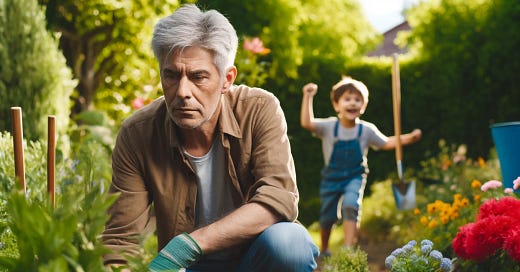The Gardener
by Robert Louis Stevenson
The gardener does not love to talk,
He makes me keep the gravel walk;
And when he puts his tools away,
He locks the door and takes the key.
Away behind the current row
Where no one else but the cook may go,
Far in the plots, I see him dig,
Old and serious, brown and big.
He digs the flowers, green, red, and blue,
Nor wishes to be spoken to.
He digs the flowers and cuts the hay,
And never seems to want to play.
Silly gardener! summer goes,
And winter comes with pinching toes,
When in the garden, bare and brown
You must lay your barrow down.
Well, now, and while the summer stays,
To profit from these garden days
O, how much wiser you would be
To play at Indian Wars with me!
The poem is from the collection A Child's Garden of Verses. It is written for an audience of children. The narrator of the poem is a young boy.
The poem evokes a sense of nostalgia, beautifully contrasting the diligent, work-focused nature of an old gardener with a child's carefree, whimsical attitude. The gardener, a silent, hardworking kind of man, starkly contrasts with the child, who loves to play and is free from the burdens of work.
The child observes the gardener from a distance, narrating his every move as he tends to the vibrant mix of green, red, and blue flowers. In all his innocence, the child finds the gardener's seriousness amusing, contrasting it with his playful nature.
This change in the seasons, a powerful symbol of life's cyclical nature, causes the child to realize that winter is coming. Don't we all wish the gardener would spend all his days working and playing games with the child?
"The Gardener" poignantly illustrates how a working adult values time and leisure completely differently from a child with no concerns. The gardener never stops working. But the child loves to play and be carefree in these moments. This stark contrast in their perspectives invites us to empathize with the adult's drive for productivity and the child's desire for play.
The poem provokes wonderful memories of my childhood. The men went to work while my friends and I played outside during the hot days of July and August. I clearly remember not having a care in the world while we were playing. Yes, I identify with the child rather than the gardener.




